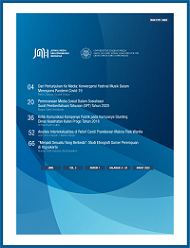From Scorching Desert to Tropical Paradise: New Form of Video Game Orientalism in Far Cry 3
Angga Prawadika Aji(1*)
(1) Lecturer at Communication Department, Universitas Airlangga
(*) Corresponding Author
Abstract
This paper provides an analysis of different form of orientalism found in the third title of the popular Far Cry game series. The open world system offered by Far Cry 3 brings a new nuance in the discourse of orientalism in video games, especially within the context of military shooter game. It provides both opportunities and challenges for developers to build ‘world’ as real as possible for players to explore. This construction process often reflects the orientalism practices shown by game developers in describing Eastern society and culture. Through a variety of activities such as hunting, exploring, sailing, and killing enemy forces, the player acts as a 'western mediator' who intepret the simulated Eastern world as a strange and mysterious territory.
Keywords
Full Text:
PDFReferences
Breuer, Johannes, Ruth Festl, and Thorsten Quandt. 2012. “Digital War : An Empirical Analysis of Narrative Elements in Military First-Person Shooters.” Journal of Gaming & Virtual Worlds 4 (3): 215–37. https://doi.org/10.1386/jgvw.4.3.215.
Dietz, Tracy. 1998. “An Examination of Violence and Gender Role Portrayals in Video Games: Implications for Gender Socialization and Aggressive Behavior.” Sex Roles 38 (5–6): 425–42. https://doi.org/10.1023/A:1018709905920.
Douglas, Christopher. 2002. “‘You Have Unleashed a Horde of Barbarians!’: Fighting Indians, Playing Games, Forming Disciplines.” Postmodern Culture 13 (1). http://pmc.iath.virginia.edu/issue.902/13.1douglas.html.
Driver, Felix, and Martins Luciana. 2005. Tropical Visions in an Age of Empire. Chicago: The University of Chicago Press. https://doi.org/10.1111/j.1467-9493.2008.00331.x.
Dyer, Mitch. 2013. “The Development Secrets of Far Cry 3.” Ign.Com. 2013. https://www.ign.com/articles/2013/01/30/the-development-secrets-of-far-cry-3.
Fairclough, Norman. 1995. Critical Discourse Analysis : The Critical Study of Language. New York: Longman Publishing.
———. 2003. Analysing Discourse: Textual Analysing for Social Research. London: Routledge.
Galloway, Alexander R. 2004. “Social Realism in Gaming.” Game Studies 4 (1). http://gamestudies.org/0401/galloway/.
Girsang, Lasmery R M. 2020. “Women as Opinion Leaders within Community : A Model of Feminism Perspective.” Jurnal Aspikom 5 (1): 1–10. https://doi.org/http://dx.doi.org/10.24329/aspikom.v5i1.546.
Gough, Christina. 2016. “Genre Breakdown of Video Game Sales in the United States in 2018.” Statista.Com. 2016. https://www.statista.com/statistics/189592/breakdown-of-us-video-game-sales-2009-by-genre/.
Hoglund, Johan. 2008. “Electronic Empire: Orientalism Revisited in the Military Shooter.” Game Studies 8 (1). http://gamestudies.org/0801/articles/hoeglund.
Jansz, Jeroen, and Raynel G Martis. 2007. “The Lara Phenomenon : Powerful Female Characters in Video Games.” Sex Roles 56 (3–4): 141–48. https://doi.org/10.1007/s11199-006-9158-0.
Komel, Mirt. 2014. “Self-Orientalizing The Assassins from Forerunners of Modern Terrorism Into Occidentalized Heroes.” Teorija in Praksa 51 (1): 72–90. http://dk.fdv.uni-lj.si/db/pdfs/TiP2014_1_Komel.pdf.
Kurnia, Novi. 2017. “CONSUMING GENDER AND DISABILITY.” Jurnal Aspikom 3 (3): 570–87.
Lammes, Sybille. 2010. “Postcolonial Playgrounds : Games as Postcolonial Cultures.” Eludamos Journal for Computer Game Culture 4 (1): 1–6. https://www.eludamos.org/index.php/eludamos/article/view/vol4no1-1/149.
Leonard, David. 2015. “Not a Hater, Just Keepin ’ It Real : The Importance of Race- and Gender-Based Game Studies.” Games and Culture 1 (1): 83–88. https://doi.org/10.1177/1555412005281910.
Mantello, Peter. 2013. “Legitimacy and the Virtual Battlefield: Putting the First-Person Shooter on the Witness Stand.” Australian Journal of International Affair 67 (5): 37–41. https://doi.org/10.1080/10357718.2013.817523.
Marandi, Seyed Mohammad. 2009. “Constructing an Axis of Evil : Iranian Memoirs in the ‘ Land of the Free .’” American Journal of Islamic Social Sciences 29 (2): 23–47. https://www.ajiss.org/index.php/ajiss/article/view/377.
Mukherjee, Souvik. 2016. “Playing Subaltern : Video Games and Postcolonialism.” Games and Culture 13 (5): 1–17. https://doi.org/10.1177/1555412015627258.
Power, Marcus. 2007. “Digitized Virtuosity: Video War Games and Post-9/11 Cyber-Deterrence.” Security Dialogue 38 (November 2004): 271–88. https://doi.org/10.1177/0967010607078552.
Riegler, Thomas. 2010. “On the Virtual Frontlines : Video Games and the War on Terror.” In Videogame Cultures and the Future of Interactive Entertainment, edited by Daniel Riha, 1st ed., 53–63. Oxford: Inter-Disciplinary Press.
Said, Edward. 1978. Orientalism. New York City: Pantheon Books.
———. 1998. “Islam Through Western Eyes.” Thenation.Com. 1998. https://www.thenation.com/article/islam-through-western-eyes/.
Schwartz, Leigh. 2006. “Fantasy, Realism, and the Other in Recent Video Games.” Space and Culture 9 (3): 313–25. https://doi.org/10.1177/1206331206289019.
Sefton, Jamie. 2008. “The Roots of Open World Game.” Gamesradar.Com. 2008. https://www.gamesradar.com/the-roots-of-open-world-games/.
Sicart, Miguel. 2008. “Defining Game Mechanics.” Game Studies 8 (2). http://gamestudies.org/0802/articles/sicart.
Sisler, Vit. 2008. “Digital Arabs : Representation in Video Games.” European Journal of Cultural Studies 11 (2): 203–19. https://doi.org/10.1177/1367549407088333.
Stahl, Roger. 2006. “Critical Studies in Media Have You Played the War on Terror ?” Critical Studies in Media Communication 23 (2): 37–41. https://doi.org/10.1080/07393180600714489.
Tucker, Elmer. 2008. “The Orientalist Perspective : Cultural Imperialism in Gaming.” Gameology. http://www.aughty.org/pdf/orientalist_perspective.pdf.
Zwieten, Martijn Van. 2011. “Danger Close : Contesting Ideologies and Contemporary Military Conflict in First-Person Shooters.” In Proceedings of DiGRA Conference: Think Design Play. Hilversum.
Article Metrics
Refbacks
- There are currently no refbacks.
Copyright (c) 2021 Jurnal Media dan Komunikasi Indonesia
| Jurnal Media dan Komunikasi Indonesia (Online ISSN 2721-396X) is published by the Department of Communication Science (DIKOM), Faculty of Social Science and Political Science (FISIPOL), Gadjah Mada University |












